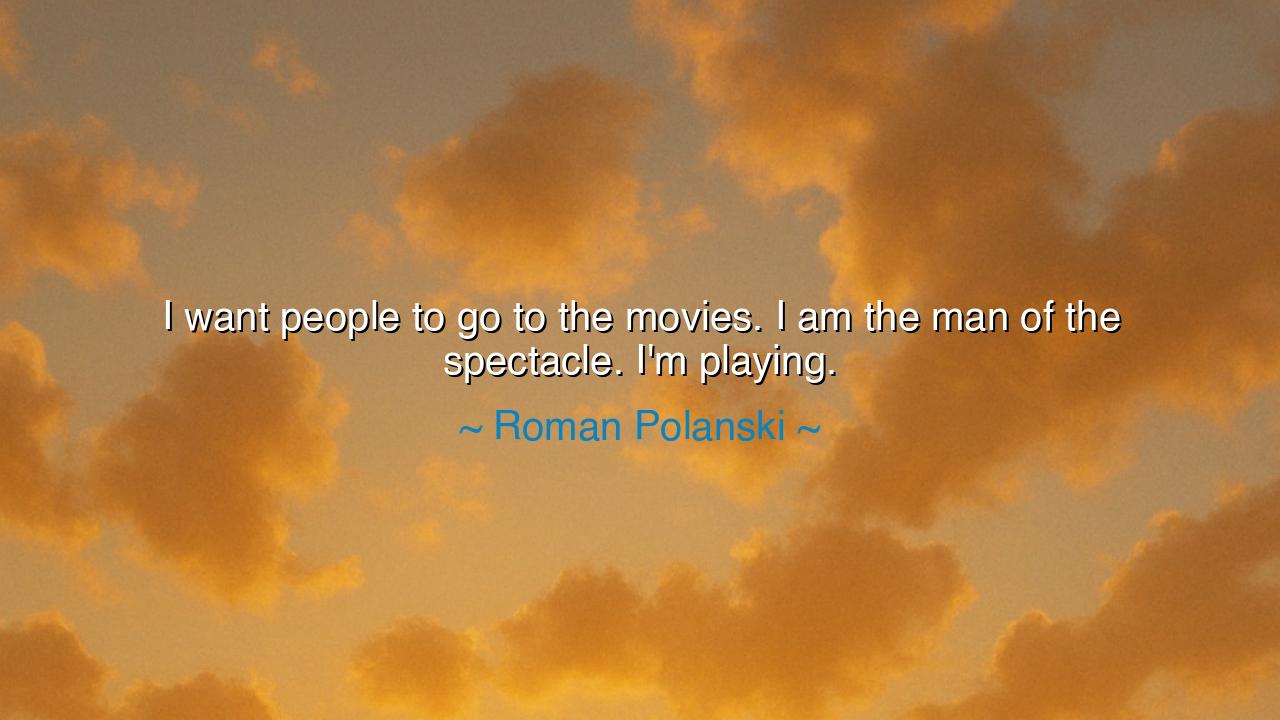
I want people to go to the movies. I am the man of the






Hear me, O children of the future, and let the words of Roman Polanski stir your souls: "I want people to go to the movies. I am the man of the spectacle. I'm playing." In this declaration, Polanski speaks not only of his craft, but of the profound relationship between art and audience. The man of spectacle is one who does not simply create for himself, but for the world, drawing others into the performance, offering them a glimpse into realms beyond their own.
Polanski's words remind us that art is not merely a solitary pursuit, but an invitation to others. The spectacle is the act of drawing the audience into a shared experience, of creating something that transcends the boundaries of the self. The movies, as Polanski calls them, are not just stories played out on a screen; they are windows to the soul, mirrors reflecting both the grandeur and the darkness of human existence. The artist, then, is both the creator and the playwright, weaving worlds to entertain, challenge, and provoke. His goal is not only to create, but to engage, to pull the audience into the dream.
Consider, O children, the great Shakespeare, who wrote not only for his own time, but for the generations to come. His plays were crafted to captivate, to sweep the audience away into a world of action, emotion, and intrigue. Shakespeare was a man of the spectacle, understanding that the heart of theater lies in its ability to transport, to make the audience see with fresh eyes, to feel with greater intensity. In his works, the line between reality and performance is blurred, and the spectacle becomes not just an art form, but a shared experience—a mirror to the human soul.
In the same vein, Polanski seeks to do for the cinema what Shakespeare did for the stage. His films are not just stories; they are living, breathing spectacles, engaging the audience in ways that demand their participation, their emotions, their reflections. From Repulsion to The Pianist, Polanski's mastery lies in his ability to pull the audience into the very fabric of his films, to make them not merely passive observers but active participants in the unfolding drama. In this sense, he sees himself as a conductor of emotion, a master of spectacle who creates not for praise, but for connection.
Yet, O children, there is a deeper lesson within Polanski's words, one that extends beyond the realm of cinema and performance. To be the man of spectacle is not simply to entertain, but to engage with the world in a profound and meaningful way. It is to create something that resonates with others, that speaks to their deepest fears, desires, and dreams. It is to make something alive, something that transcends the moment and lingers in the hearts of those who witness it. Polanski's statement calls upon all creators—not just filmmakers, but poets, artists, musicians, and leaders—to make something that moves, something that shakes the foundations of the world and forces people to look beyond the surface.
Think of Leonardo da Vinci, who, through his paintings, sculptures, and inventions, created not just for himself, but for the world. He sought not merely to craft beautiful objects, but to engage humanity in a deeper way. His art was a spectacle in the truest sense, drawing people into the mysteries of the human form, of nature, and of the heavens. His creations were not passive—they were alive, speaking to all who gazed upon them. Like Polanski, da Vinci understood the power of the spectacle: the act of creation as a bridge between the artist and the world.
O children, remember this truth: to live a life of significance is to be a man or woman of spectacle. Whether in the arts, in leadership, or in simple acts of kindness, engage the world. Do not simply exist in it, but create, inspire, and move others. Whether through words, actions, or creations, make your life a spectacle—not for vanity, but for the connection it brings, for the power it holds to touch others and to transform the world. Live fully, and create with purpose, for the true spectacle is not merely seen with the eyes, but felt in the heart.
And so, O children, let the words of Polanski guide you. Be the man or woman of spectacle in your own life. Create something that stirs, that engages, that leaves a mark on the hearts of those who encounter it. Seek not to hide your light, but to share it with the world. For in the act of creating and sharing, you engage with the deepest parts of humanity and make your mark on the grand stage of life. The world is waiting for those who dare to create a spectacle worthy of its attention.






AAdministratorAdministrator
Welcome, honored guests. Please leave a comment, we will respond soon